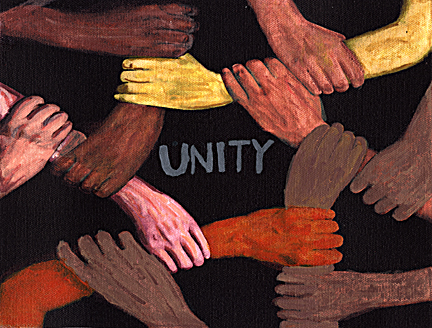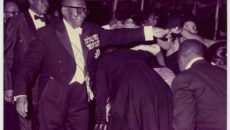Touring Red Light, a commercial suburb outside Monrovia, was a painful experience for me this past Unification Day. Even on this national holiday, there was no space for pedestrians to easily travel or pass through as street peddlers and petty traders flooded Red Light in pursuit of economic survival.
A teenager of age 15 who was selling cold water said to me:
“I have been selling cold water now for about three years. I am not in school because what I do can only put food on our table. It is not easy to wake-up every morning and sell this water until evening. Sometimes, I go home by 7:00 p.m. Whether rain or sun, I have to sell cold water; otherwise, we will not eat. I have to do this business because my parents are poor and have no money to send me to school.â€
After hearing this troubling revelation on Unification Day especially from a child whose future is already being jeopardized as a result of poverty and lack of opportunity, I was provoked to pen these thoughts.
Beyond every speck of doubt, hopelessness is increasingly evident in Liberia – what a hopeless Unification Day it was! Like the young teenager, thousands of Liberian children, as well as youth and elderly citizens, are going through this terrifying and dehumanizing experience.
After 170 years of sovereignty, the gap between the poor and the prosperous remains wide. A handful of self-seeking characters continue to prosper and bath in opulence at the expense of the ordinary masses.
How then can we celebrate Unification Day?
There can be no unification in the midst of increasing economic disparity and inequality. There can be no unification when poverty is eating up Liberians like the Ebola virus.
Even on a national holiday like Unification Day, the masses were selling cold water and crushing rocks under the hot sun while the bourgeoisies and elites lavished the nation’s wealth at establishments like Royal Grand, Boulevard Palace, Palm Spring, Havana Lodge, Kendeja Hotel, and Golden Key.
Is this how Liberia will be unified? How can we celebrate Unification Day when many of our citizens are still forced to engage in drug abuse, gambling, rock crushing, sand mining, pen-pen riding, prostitution, and begging?
How can we brag about Unification Day and a “nation indivisible†when the best jobs for Liberian youth are store boys, container off-loaders, motorcyclists, zogos, security guards, street peddlers, carboys, and cold water sellers?
How can national unity exist when civil servants are receiving between US$100 and US$150 per month while high-ranking public officials are becoming millionaires overnight? We cannot celebrate Unification Day when slum communities are increasing while a handful of pseudo-patriots and capitalists live in palaces and mansions.
Our people cannot be happy or unified when the following gloomy statistics exist.
Even after 170 years of independence, Liberia is the fourth poorest country in the world. Liberia was ranked as the most corrupt country on planet earth. Our country had 554 rape cases just in a period of 12 months. Moreover, over 500 children die every year in Liberia from diarrhea due to unsafe water and poor sanitation.
I could go ahead outlining those scaring statistics in regards to the appalling living condition of our people, but what is of the essence now is for all of us to find a concrete and sustainable solution to these sickening realities. It is no secret that the country we cherish so dearly lies in ruin as the vast majority of its citizens remain under a devastating canopy of misery.
The desperation of most Liberians to embrace a new destiny of socio-economic parity remains a compelling priority. The campaign to ensure inclusive development in all fifteen political subdivisions of our nation is imperative.
Declaring May 14th of each year through an act of Legislature in 1960 as a National Unification Day was a unique step forward to defeating disunity and deep division between the Americo-Liberian elites and the indigenous majority. During this time, there was total disintegration between forces of the minority class and the majority class. One group felt supreme than the other and thought Liberia was a family plantation or empire. As a result of their cruel and inhumane action against the vast majority of the people, our nation was bewildered and befuddled by visible injustices.
We could not afford to coexist in a country where less than five percent of the population had exclusive authority to decide the political fate and economic paradigm of 95 percent of the people.
As a result of this divisive tendency and anti-democratic precedent, President William V. S. Tubman, who led Liberia from 1944 to 1971, saw it prudent to introduce the Unification Policy. This national plan was intentionally meant to foster unity and brotherhood among all Liberians irrespective of culture or creed. There was a pressing demand for reconciliation between Americo-Liberians and indigenes. National integration was a matter of national emergency.
Finally, the peace pipe was blown in 1960 between the majority and the minority after a prolonged era of vicious suppression, discrimination, and segregation. Many Liberians and some foreign partners, thought that the Unification Policy would have integrated every sphere of our society; unfortunately, this has never been the case. Even after more than five decades since this day was first observed on May 14, public discontent due to bad governance remains a common phenomenon across Liberia.
Our sweet land of liberty has been torn apart by greed, nepotism, corruption, inequality and patronage. Our sweet land of liberty has become a bitter land of misery. What a hopeless unification day!
In fact, what is the significance of celebrating Unification Day when those who we have entrusted with political offices are compromising our interest every day? National Unification starts with patriotism. Integration comes through public transparency and integrity. It must begin with the proper management and equitable distribution of the nation’s resources. We cannot keep celebrating this day every year when the condition of our people is worsening.



